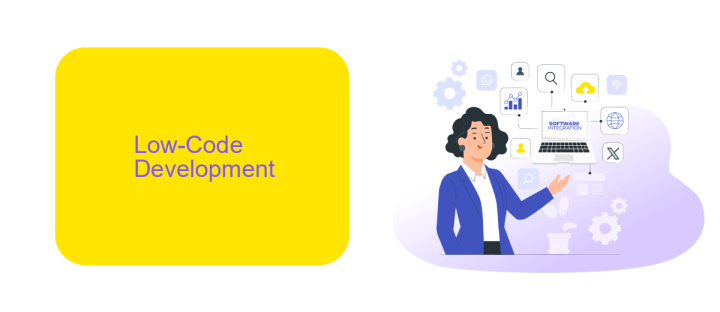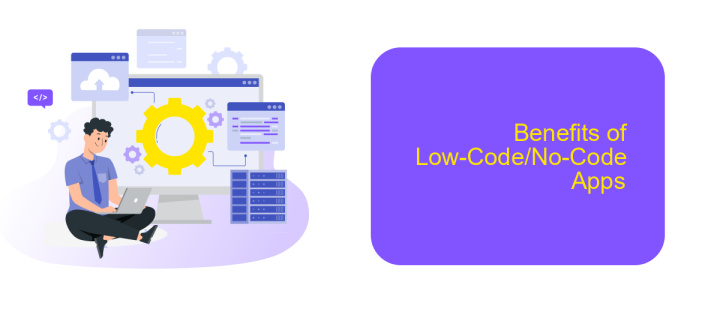Low-Code No-Code Apps
Low-Code No-Code (LCNC) applications are revolutionizing the software development landscape by empowering individuals with minimal technical expertise to create functional and sophisticated apps. These platforms streamline the development process, reducing the need for extensive coding knowledge and enabling faster project turnaround times. In this article, we explore the benefits, use cases, and future potential of LCNC applications in various industries.
Introduction
Low-Code and No-Code platforms are revolutionizing the way businesses develop applications by significantly reducing the need for traditional coding skills. These platforms empower non-technical users to create functional applications through intuitive drag-and-drop interfaces, thereby accelerating development cycles and reducing costs.
- Ease of Use: User-friendly interfaces that require minimal technical knowledge.
- Speed: Rapid development and deployment of applications.
- Cost-Effective: Lower development and maintenance costs.
- Flexibility: Easily customizable to meet specific business needs.
- Integration: Seamless integration with existing systems and third-party services.
One of the key advantages of Low-Code and No-Code platforms is their ability to integrate with various services effortlessly. For instance, ApiX-Drive offers robust integration solutions that allow users to connect their applications with multiple third-party services without writing a single line of code. This flexibility makes it easier for businesses to streamline workflows and enhance productivity.
Low-Code Development

Low-code development is a streamlined approach to software creation that minimizes the need for extensive coding. By utilizing visual interfaces and pre-built components, developers can rapidly build applications with reduced manual coding effort. This method not only accelerates the development process but also opens up opportunities for non-technical users to participate in app creation, fostering greater collaboration within teams. Low-code platforms often come with drag-and-drop features, making it easier to design, test, and deploy applications in a fraction of the time compared to traditional coding methods.
One of the key advantages of low-code development is its capability to integrate various services seamlessly. For instance, ApiX-Drive offers a powerful solution for setting up integrations without requiring extensive technical knowledge. With ApiX-Drive, users can connect different applications and automate workflows, enhancing the functionality of their low-code solutions. This integration capability ensures that businesses can leverage multiple tools and services efficiently, thus maximizing productivity and operational efficiency. Overall, low-code development, combined with robust integration services like ApiX-Drive, provides a flexible and efficient approach to modern software development.
No-Code Development

No-code development is revolutionizing the way individuals and businesses create software applications. By eliminating the need for traditional coding, it empowers users with little to no programming experience to build functional and complex apps. This approach leverages visual development tools, drag-and-drop interfaces, and pre-built templates to simplify the app creation process.
- Visual Development Tools: These tools allow users to design app interfaces and workflows visually, without writing code.
- Drag-and-Drop Interfaces: Users can easily add and arrange elements on the app screen, making the design process intuitive and user-friendly.
- Pre-built Templates: Ready-made templates help users get started quickly by providing a foundation that can be customized to meet specific needs.
- Integration Services: Platforms like ApiX-Drive facilitate seamless integration with various third-party services, enhancing app functionality without complex coding.
No-code platforms democratize app development, making it accessible to a broader audience. They accelerate the development process, reduce costs, and enable rapid prototyping and iteration. With tools like ApiX-Drive, users can effortlessly connect their apps to external services, streamlining workflows and enhancing productivity. As no-code development continues to evolve, it is poised to become a cornerstone of digital transformation strategies.
Benefits of Low-Code/No-Code Apps

Low-code and no-code applications have revolutionized the way businesses develop software by simplifying the development process. These platforms enable users with little to no programming knowledge to create functional applications, significantly reducing the time and cost associated with traditional software development.
One of the primary benefits of low-code/no-code apps is the ability to quickly prototype and iterate on ideas. This agility allows businesses to respond faster to market changes and customer needs, fostering innovation and competitive advantage.
- Accelerated development timelines
- Reduced costs and resource allocation
- Enhanced collaboration between technical and non-technical teams
- Increased agility and responsiveness to market demands
Moreover, these platforms often come with built-in integration capabilities, streamlining the process of connecting various systems and services. For instance, ApiX-Drive is an excellent tool that facilitates seamless integration between different applications, ensuring that data flows smoothly across your ecosystem. This not only enhances operational efficiency but also allows businesses to leverage existing tools more effectively.
- Automate the work of an online store or landing
- Empower through integration
- Don't spend money on programmers and integrators
- Save time by automating routine tasks
Challenges and Considerations
While Low-Code No-Code (LCNC) apps offer significant advantages in terms of speed and accessibility, they come with their own set of challenges. One of the primary issues is the limitation in customization. These platforms often provide a range of pre-built templates and modules, which may not always meet specific business needs. Additionally, there can be concerns about scalability and performance, especially for applications that need to handle large volumes of data or complex processes.
Another important consideration is integration. LCNC platforms may not always seamlessly integrate with existing systems and third-party services. For businesses requiring robust integration capabilities, services like ApiX-Drive can be invaluable. ApiX-Drive enables easy and efficient integration between various applications, ensuring that data flows smoothly across different platforms. Security is also a critical factor; LCNC apps must adhere to stringent security standards to protect sensitive data. Therefore, thorough evaluation and planning are essential to successfully implement LCNC solutions.
FAQ
What are Low-Code No-Code apps?
Who can benefit from using Low-Code No-Code platforms?
Can Low-Code No-Code apps be integrated with other systems?
Are Low-Code No-Code platforms secure?
What types of applications can be built using Low-Code No-Code platforms?
Routine tasks take a lot of time from employees? Do they burn out, do not have enough working day for the main duties and important things? Do you understand that the only way out of this situation in modern realities is automation? Try Apix-Drive for free and make sure that the online connector in 5 minutes of setting up integration will remove a significant part of the routine from your life and free up time for you and your employees.


